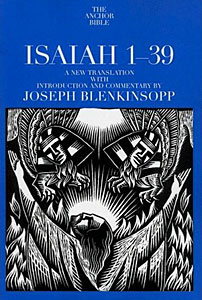- Home
- /
- Buitenlandse boeken
- /
- Commentaren / AB 19A: Isaiah 40 - 55

AB 19A: Isaiah 40 - 55
A New Translation with Introduction and Commentary.Scholars
have traditionally isolated three distinct sections of what is known as the
Book of Isaiah, and in Isaiah 40-55, distinguished biblical scholar
Joseph Blenkinsopp provides a new translation and critical commentary on the
section usually referred to as Second or Deutero Isaiah. The second volume in a
three-volume commentary, it easily maintains the high standards of academic
excellence established by Isaiah 1-39.
Second
Isaiah was written in the sixth century b.c.e., in the years just before the
fall of the mighty Babylonian Empire, by an anonymous prophet whom history has
erroneously identified with the real Isaiah (born ca. 765 b.c.e.). Scholars
know Second Isaiah was written by someone other than Isaiah because the
contexts of these prophecies are so very different. When Second Isaiah was
written, the prophet believed that Israel?s time of suffering was drawing to a
close. There was, he insisted, a new age upon them, a time of hope, peace, and
renewed national prosperity. The main thrust of the prophet?s argument was
intended to rally the spirits of a people devastated by war and conquest. One
of the most famous examples of this optimistic tone is the well-known and
beloved Song of the Suffering Servant, which is found in Chapters 52?53, and
about which Blenkinsopp has some challenging new ideas.
The final
chapters of Second Isaiah, however, are in an entirely different key as it
becomes clear that the new world the prophet foresaw earlier was not going to
come to pass. This despair finds its most poignant expression in the final
section of the Book of Isaiah, which Blenkinsopp will address in his third
volume.'Contrary to the current trend that it is virtually
impossible to get to authentic eighth-century Isaiah, even in chapters 1-39,
Blenkinsopp does hold that there is a substratum of such material, though he
believes 'the eighth-century B.C.E. prophet has been buried under an exegetical
mountain. All three volume have lengthy and informative introductions as well
as extensive bibliographies.' - Tremper LongmanSeries: Anchor Yale
Bible, volume 19A.Recommended € 49,90
have traditionally isolated three distinct sections of what is known as the
Book of Isaiah, and in Isaiah 40-55, distinguished biblical scholar
Joseph Blenkinsopp provides a new translation and critical commentary on the
section usually referred to as Second or Deutero Isaiah. The second volume in a
three-volume commentary, it easily maintains the high standards of academic
excellence established by Isaiah 1-39.
Second
Isaiah was written in the sixth century b.c.e., in the years just before the
fall of the mighty Babylonian Empire, by an anonymous prophet whom history has
erroneously identified with the real Isaiah (born ca. 765 b.c.e.). Scholars
know Second Isaiah was written by someone other than Isaiah because the
contexts of these prophecies are so very different. When Second Isaiah was
written, the prophet believed that Israel?s time of suffering was drawing to a
close. There was, he insisted, a new age upon them, a time of hope, peace, and
renewed national prosperity. The main thrust of the prophet?s argument was
intended to rally the spirits of a people devastated by war and conquest. One
of the most famous examples of this optimistic tone is the well-known and
beloved Song of the Suffering Servant, which is found in Chapters 52?53, and
about which Blenkinsopp has some challenging new ideas.
The final
chapters of Second Isaiah, however, are in an entirely different key as it
becomes clear that the new world the prophet foresaw earlier was not going to
come to pass. This despair finds its most poignant expression in the final
section of the Book of Isaiah, which Blenkinsopp will address in his third
volume.'Contrary to the current trend that it is virtually
impossible to get to authentic eighth-century Isaiah, even in chapters 1-39,
Blenkinsopp does hold that there is a substratum of such material, though he
believes 'the eighth-century B.C.E. prophet has been buried under an exegetical
mountain. All three volume have lengthy and informative introductions as well
as extensive bibliographies.' - Tremper LongmanSeries: Anchor Yale
Bible, volume 19A.Recommended € 49,90
42,90
AB 19A: Isaiah 40 - 55
EAN-code:
9780300140545
Aantal pagina's:
432
Bindwijze:
Paperback
Levertijd:
Binnen 1 werkdag in huis!
In winkelwagen
Anderen bekeken ook:
BECNT: Luke (2 vols.)
Darrell L. Bock - Luke is the most linguistically up-to-date and comprehensive evangelical
commentary on the Gospel now available. For quick or detailed reference, Luke ...
commentary on the Gospel now available. For quick or detailed reference, Luke ...
94,90
In winkelwagen
NAC 21A: Haggai, Malachi
Richard A. Taylor - 'The strength of the New American Commentary is that it genuinely focuses on
what the text says. This does not mean that ...
what the text says. This does not mean that ...
35,90
In winkelwagen
BST: Obadiah, Nahum and Zephaniah
Gordon Bridger - Obadiah, Nahum and Zephaniah are probably among the least-read books of the Bible and are rarely preached. However, Gordon Bridger encourages us to ...
12,90
In winkelwagen
Meer van deze auteur...
AB 19: Isaiah 1 - 39
Joseph Blenkinsopp - A New Translation with Introduction and Commentary.Writing a commentary on the book of Isaiah in the middle of a paradigm shift in biblical ...
52,90
In winkelwagen
AB 19B: Isaiah 56 - 66
Joseph Blenkinsopp - A New Translation with Introduction and Commentary.The
worldÉs leading authority on the prophet Isaiah brings his distinguished
three-volume commentary on the book of ...
worldÉs leading authority on the prophet Isaiah brings his distinguished
three-volume commentary on the book of ...
56,90
In winkelwagen





